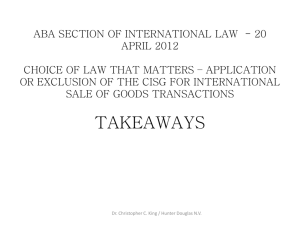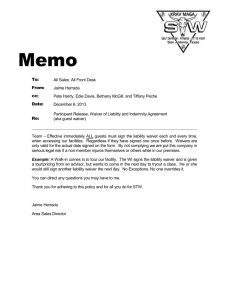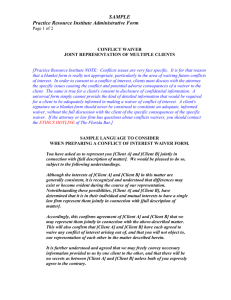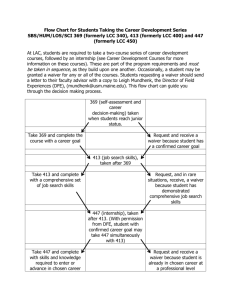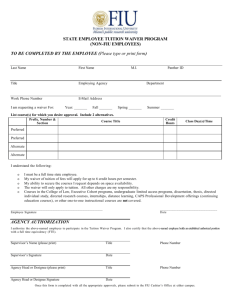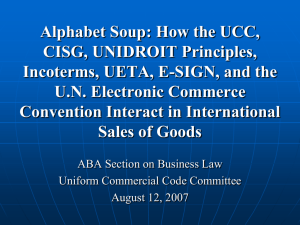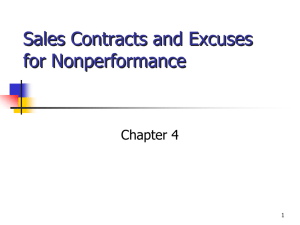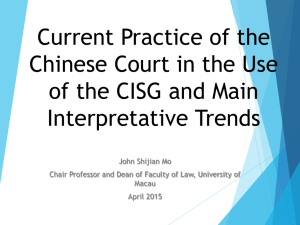Contracts 2 Week 4 Class 2 (class 8 of 14) Express Conditions
advertisement
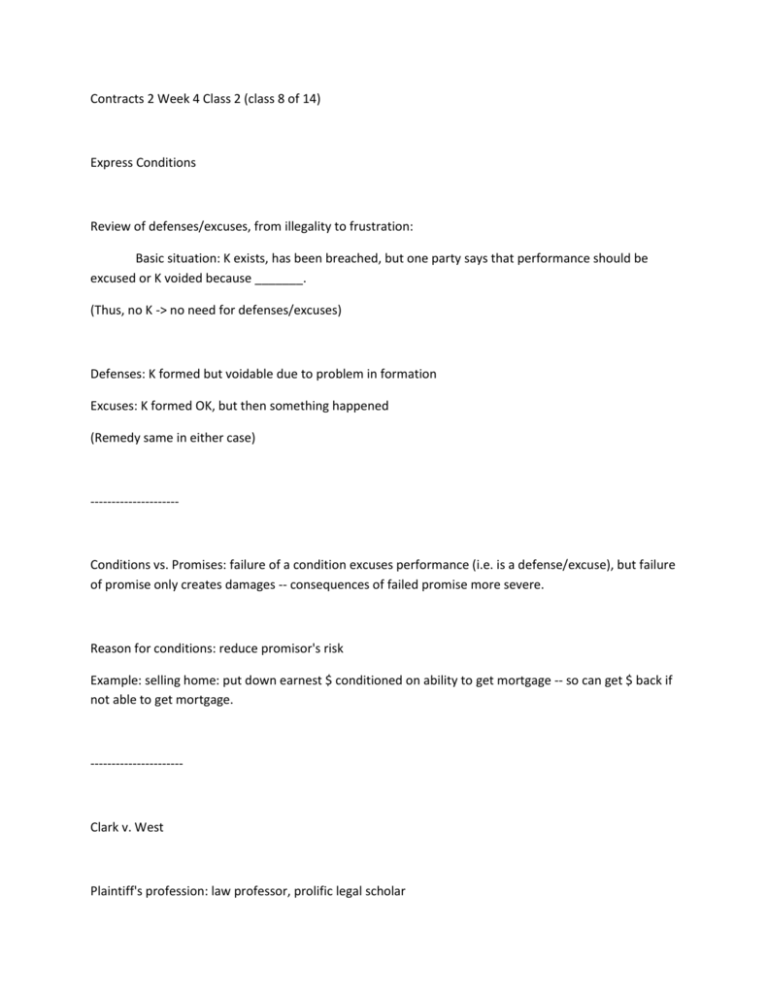
Contracts 2 Week 4 Class 2 (class 8 of 14) Express Conditions Review of defenses/excuses, from illegality to frustration: Basic situation: K exists, has been breached, but one party says that performance should be excused or K voided because _______. (Thus, no K -> no need for defenses/excuses) Defenses: K formed but voidable due to problem in formation Excuses: K formed OK, but then something happened (Remedy same in either case) --------------------- Conditions vs. Promises: failure of a condition excuses performance (i.e. is a defense/excuse), but failure of promise only creates damages -- consequences of failed promise more severe. Reason for conditions: reduce promisor's risk Example: selling home: put down earnest $ conditioned on ability to get mortgage -- so can get $ back if not able to get mortgage. ---------------------- Clark v. West Plaintiff's profession: law professor, prolific legal scholar C is a known drunkard; terms of K w/West: if C abstains from drink -> C gets additional $4/page (base rate $2/page) Claim: West waived condition West: Abstinence was actually consideration for the additional $4/page, so not waivable Two interpretations: (I) C gets paid, and gets paid more if C doesn't drink - Consideration is writing, abstinence is just a condition (therefore waivable) (II) C gets paid $2/page, gets paid another $4/page in exchange for not drinking - Abstinence is the actual consideration for the $4, therefore not waivable Possible (III): Abstinence is consideration for modification of K. Neither II nor III works: can't modify a K at the same time as its original formation, and can't have contract with no consideration. Q: Why does West care about C's drinking? A: Sobriety is *assumed* to be necessary condition to finishing the book (but wasn't in this case). Waiver: voluntary & intentional relinquishment of a known right. Usually must be clear & unambiguous. (Reason: prevent forfeiture - great loss to one party.) Would it be forfeiture here to enforce the condition? Ct: Yes, because West got book, no problem with quality, but C would get nothing. Public policy Q: Should a K be able to prevent legal conduct that demonstrably has no effect on work? (Cf. drug tests) =================== Waiver & modification Modification: - Requires consideration @ CL, but not under UCC 2-209 - Requires writing if w/i SOF - Must be agreed; cannot be undone unilaterally - Permanent change to K Waiver: - Never requires consideration - Doesn't have to be in writing, even if w/i SOF - Does not require agreement; can be revoked UNLESS relied on - May be temporary (i.e. waiving in one instance, not permanently) Typical case of waiver: take out a loan, must make payment on 15th or face foreclosure on 21st; miss payment, but bank will waive if it's in their interest; can waive for this month without waiving foreclosure right generally; bank could revoke waiver even for this month UNLESS borrower has relied on the waiver (e.g. borrower had $ but paid someone else). ------------------------- Express & constructive conditions 3 kinds of conditions: express, implied constructive; but no key difference between express & implied -both equally enforceable Express conditions: -"if... then" or "provided that..." etc. - One party's obligation is conditioned on the other's performance - Always enforced UNLESS enforcement would result in a forfeiture (i.e. grossly lopsided outcome). Example: 98% of work done by deadline; would be forfeiture to enforce strict deadline conditions Constructive conditions: - Example: UCC gap-fillers determining rules for time, manner & place of delivery. - CL example: if Party 1's performance takes time and Party 2's doesn't, then Party 1's performance is (constructive) condition of Party 2's. (= payment on delivery, rather than before) ---------------------------- Morin v. Baystone GM contract for siding on Chevy plant in Muncie; completion subject to GM's approval. Jury instruction: reasonable person standard. Q for appeal: was this proper? Posner: Yes. - Some cts.: rejection is OK unless in bad faith - R2d 228: "reasonable person" standard EVEN IF the K gives one party discretion. IF objective evaluation possible, RPS applies IF matter of aesthetics/fancy, no RPS Court's goal: imply only term that parties would have agreed to. Problem: artistic effect clause -- "first class in every respect" Q: How does Posner address this? A: Just a form contract, not tailored to the situation. Q: Is there a canon-of-construction problem? Supposed to give effect to each clause. But other COC says that K should be construed to be commercially reasonable. Scalia vs. Llewellyn: Scalia says COC are always right, never contradict; Llewellyn says COC are nonsense and can be used to construe a K either way depending which COC you choose. Posner: Middle approach -- bedrock rule: give effect to parties' actual intent. -------------------------- CISG: Convention on International Sale of Goods "The international UCC" What you must know: - It's supreme law of land, per US Constitution - Applies to international sale of goods between parties in different countries that are both CISG parties (which most countries are) - Does NOT apply to goods sold directly for personal or household use. - Does NOT apply to shift or aircraft Usually, just want to "write around" CISG, specify the law that will apply. Key CISG provisions: - Firm offers do not require writing or consideration (Art. 16) - No statute of frauds (Art. 11) - No parol evidence rule (Art. 8) - Easy battle of forms (Art. 19): no mirror image rule; additional terms are IN unless material; BUT everything is material; therefore, offeror's terms govern -- Problem that arises: who is the offeror in a given situation? (Hence need to contract around CISG)
